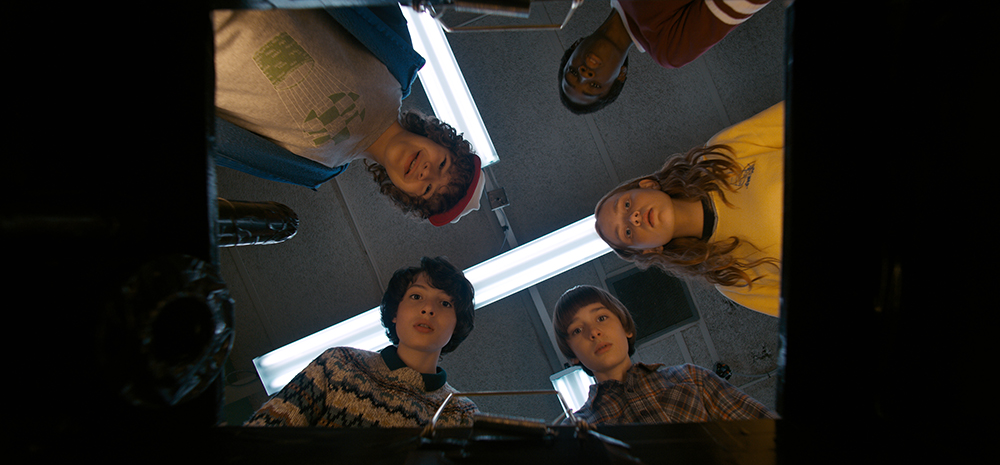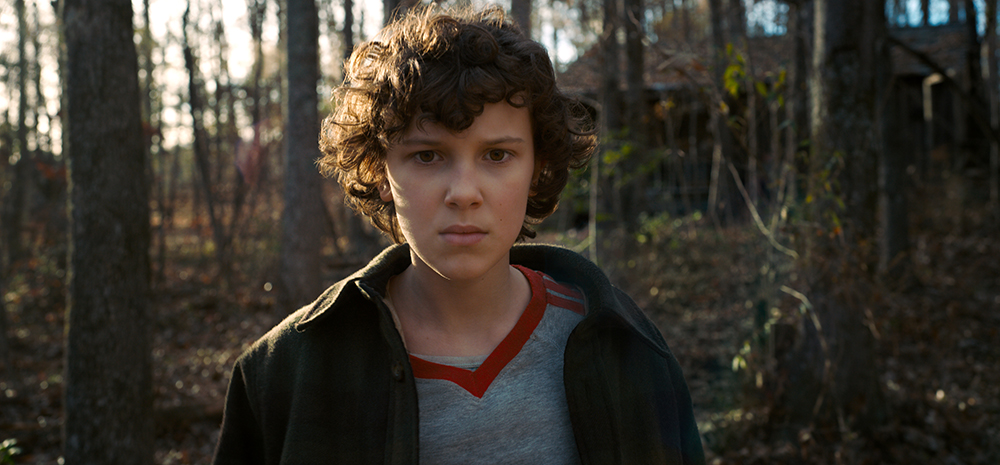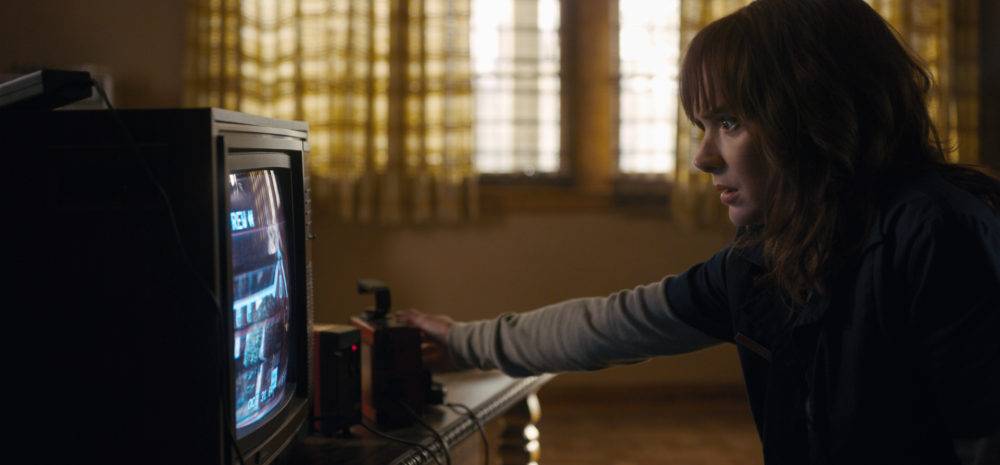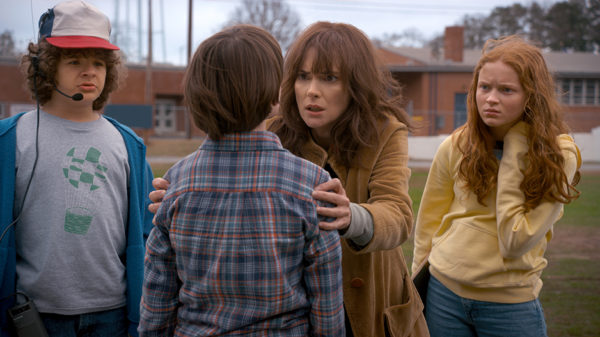Here’s our spoiler-filled review of Stranger Things 2, episode 3: The Pollywog.
Oh Dustin, Dustin what have you done?
We’re no experts, but Dustin’s new friend D’artagnan was never going be good news for the gang, was it? Only someone as purely inquisitive as our mop-haired friend could love something as obviously bad-news as a slimy creature he found in a dustbin. It’s partly why his character is so charming, but – having seen what they’ve seen, and knowing what they know – adopting it so wholeheartedly has to go down as questionable judgement. The events that follow this, only bear that out – though quite what Dart will become is worryingly uncertain.

That he’s willing to deceive his friends to protect the creature, whatever it is, stands as another example of Stranger Things’ neat trick of constantly offering its protagonists – and often antagonists – the chance to do the wrong thing for reasons that are totally relatable.
From Nancy’s drunken outburst in the last episode, back to – arguably – Brennan’s treatment of El, there are no cartoon villains in this show, and here we see both Dustin and Hopper react in questionable ways when provoked by circumstance. It trades on the idea that we can all do stupid or horrible things if offered the chance to.
To wit, Hop and El’s scenes of ‘domesticity’ continue to hit home, as El’s process of ‘growing up’ moves on to the teenage years of rebellion and questioning authority. So, when we get the smash cuts of her breaking all of Hopper’s ‘Dont Be Stupid’ rules, we know it’s bad, and wrong, but we also know exactly why she’s doing it.

On the flip-side, Bob’s well-meaning, down-home advice was always going to have repercussions, wasn’t it? The dark incessant screech underpinning the soundtrack at that point was a pretty sure indication of that… And Bob, giving the exact opposite advice to the christmas-light message from season 1, would’ve displeased Joyce, we’re sure. Thus, when will turns to face the Lost-style smoke monster at the end of the episode, we already know in our hearts that it’s the wrong decision. Just run, Will. R-U-N.
But no, he doesn’t, and once again poor Will is – this time quite literally – at the centre of the whirlwind.
That’s the big moment of episode three was working towards, with the Dustin/Dart pairing filling out the action and providing the worrying undercurrent. There’s plenty more to talk about, though.
Hop is starting to make a connection between the pumpkin blight and Hawkins lab, surprising precisely nobody. What is more of a shock, however, is the reaction of Dr Owens, who – far from the malevolent Brennan-esque force we expected – appears to be much more just a guy doing his job. Yes, he plays it with the kind of conceited swagger of a spook on a mission, but you get the definite air that he thinks he has everything under control. We’d wager he’s wrong.
While Owens is coming across less duplicitous than you may expect, in her episode 2 review, my colleague Caroline expressed her doubts as to whether Sean Astin’s Bob could possibly really be as nice as he appears to be. During the lunch scene, you almost the sense that Joyce has her doubts too; that she just can’t let herself be happy. When Bob comes to the conclusion that everything works out in the end, there’s a wonderful flash of doubt across her face.
The really heartbreaking element of Winona Ryder’s portrayal of Byers – and the addition of Sean Astin’s character to the ensemble – is that in Joyce’s most relaxed moments, the character is less herself. Perhaps at her most wary and guarded.
Joyce has been so broken by the extremes of her ordeal, that she is only really herself when things go south. When she becomes the obsessive, go anywhere, do anything, buy up the town’s supply of Christmas lights, saving her kids, mom. That’s Joyce.
It’s played like she left something in The Upside Down, and now normality is an act. The real, powerful, Joyce only appears here when she see’s the video from Halloween night. She transforms instantly into the driven thing of series 1, the incessant protective mother uninhibited by the conventions of small town life, a force of nature.

Man, I love that Joyce; poor thing.
Everything Ryder does alongside Astin has a gawky, forced undercurrent to it that, were it not for the intense tour de force moments she seemingly draws up from her well of talent to show us the real nature of her character, would appear like hackish acting. Joyce isn’t a good actor, but Ryder consistently shows she is a brilliant one, and the extra layer of performance in these scenes is a wonderful thing to watch.
For my money, Bob is too besotted to realise just how far ‘gone’ Joyce really is. Only when she is with Hopper – a person who’s seen what she’s seen – can the real character appear. That, though, feels too standard a take on the love triangle dynamic for this show, and I’m fascinated to see how it all plays out. Maybe Bob is this season’s Steve? I’m hoping he’s coming from a different direction, but will step up in the same way.
Elsewhere, Nancy has moved on from her drunken let-it-all-out session on to plotting something much more solid in terms of redeeming herself for what happened to Barb, even though it’s a very real possibility that she’s endangering herself and Barb’s parents by doing so. Steve, for his part, is struggling with not being the alpha – both in his relationship and on the basketball court. Which brings us to his new nemesis, Billy there has to be something going on with him, hasn’t there?
Unless he’s just there to put Steve’s character through the wringer, he seems far too much of a cliche for this show. What’s more, his relationship with Max has a nasty undercurrent to it, especially his rants about them being stuck in Hawkins, and telling his friend that Max is not his sister. Quite how those two play into all of this is intriguing. Billy has more to bring to the table, we’re sure.
Which brings us to Max, and Mike’s quite brilliant explanation of the party’s dynamic in D&D terms to her. This, of course, leads on to the moment where El’s jealousy at seeing them together gets the better of her and frustrates any hopes of a reunion. It’s another bittersweet moment, that – in true Stranger Things style – doesn’t feel forced as much as it does completely inevitable. El is struggling to control her powers, her increasing emotions, and getting to grips with the world. It’s a powerful parrallel to the real world of a teenager. Just with, y’know, dangerous psionic powers.
It’s indicative of the trick the show pulls off time and time again. It confounds our expectations to produce character moments that make perfect sense in terms of real life, even in the midst of all the sci-fi weirdness. The show is grounded in a human logic that is pretty close to perfect. The bad guys are the kind that are doing shitty things for reasons that make sense to their internal logic, and the good guys make bad decisions in the same way. Joyce is how any parent wishes they would react in that circumstance.
We always knew Will would stop, turn and face the monster from the moment Bob planted the thought in his head, we sense Bob means well while giving a vulnerable boy dreadful advice, that Nancy never thought she’d never see her friend again, and that Dustin believes he’s protecting something worth protecting, because they’re the same mistakes we make all the time, just with lower stakes.
Don’t you go changing, Stranger Things.
Strange Things
- Yertle, Dustin’s turtle, is a named after the Dr. Seuss story Yertle The Turtle.
- Hop and El’s little musical home-making montage was soundtracked by Jim Croce’s You Don’t Mess Around With Jim, from his 1972 album of the same name. Sadly, Croce died in a plane crash just over a year after it was released, aged just 30. If UK readers think they’ve heard it before, it was used in a Mitsubishi advert back in 2003. US readers – and some UK ones – may remember Croce (played by Don Puglisi) turned up in the US version of the show Life On Mars during the episode ‘All The Young Dudes’, where the song was also used.
- Marissa the Librarian has glammed-up a bit since season 1, hasn’t she? Good for her; she deserved better than being stood up by Hop, and she’s moved right along. You go girl.
- That badass little bit of distorted bassline riffing that soundtracks El’s rebellion and the basketball game is Go! by Tones on Tail, an offshoot of Brit goth-rock band Bauhaus. Originally released in 1984, it also turns up in the reunion disco section of another 80’s-referencing cult classic, Grosse Point Blank.
- When Hopper is seen reading to El, he’s reading from Anne of Green Gables. That’s the same book we saw him read to his daughter during his flashbacks at the end of season 1. No, you’re wiping away a little tear.

